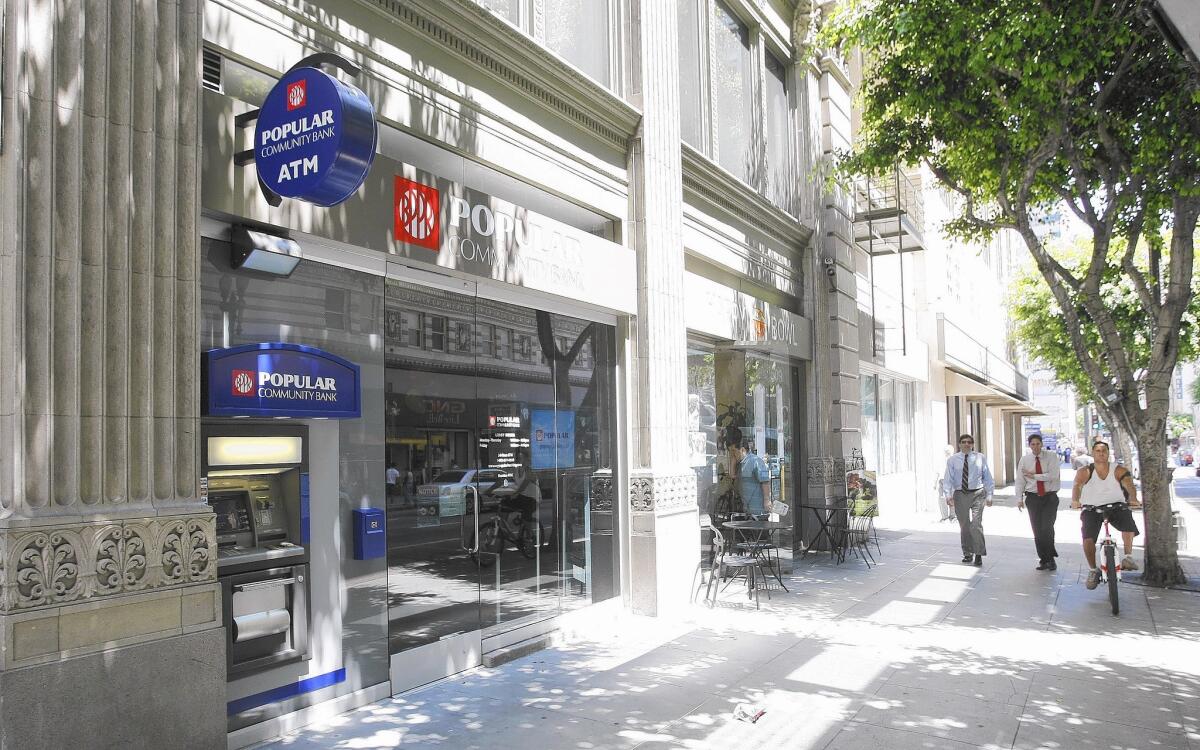Irvine bank to buy Popular branches

Banc of California, a growing community bank in Irvine, is doubling its footprint in Southern California as it joins a new wave of smaller California banks pushing to expand into regional players in the aftermath of the financial crisis and the Great Recession.
Banc of California said Wednesday that it agreed to buy 20 Popular Community Bank branches from struggling Popular Inc. in Puerto Rico, adding them to its 18 branches from Los Angeles to San Diego.
The new branches would be in lightly banked Latino neighborhoods in Los Angeles and Orange counties. Latino customers account for 37% of the $1.1 billion in deposits in those branches.
The $5.4-million deal would give Banc of California $5 billion in assets, a size approaching that of the well-regarded, 106-year-old, family-run Farmers & Merchants Bank of Long Beach and Citizens Business Bank, an Inland Empire stalwart founded 40 years ago by Chino dairy farmers.
“This puts us into the top echelon of banks under $20 billion,” said Banc of California’s president, Steven Sugarman. And he promised more growth to come.
He noted that the California banking landscape includes five bigger independent regionals, including L.A.’s City National Corp. with about $30 billion in assets, San Francisco’s First Republic Bank with more than $40 billion and Santa Clara’s Silicon Valley Bank with $25 billion.
Banc of California, recapitalized four years ago as First PacTrust Bancorp in Chula Vista, had less than
$1 billion in assets when it announced an ambitious plan to grow to $5 billion within five years. The deal with Popular would get the bank to that level well before its forecast.
Sugarman, a former management consultant, is backed by some of the nation’s largest private investment firms.
They include TCW in Los Angeles, which helped recapitalize the then wobbly bank in 2010, and Oaktree Capital Management, which came aboard Wednesday with $25 million for a 9.9% stake and the promise of up to $10 million more as the Irvine bank continues to grow.
“It’s a pretty meaningful step for us,” Sugarman said.
Popular, Puerto Rico’s biggest bank, is selling the branches together with 21 additional branches in Florida and Illinois to focus on its Puerto Rican customers in south Florida and New York City.
Though the Latino market is a new focus for Banc of California, Sugarman is known for making some bold investments. The previous acquisition of Gateway Bank, for example, expanded Banc of California into mortgage banking at a time when many community banks wanted little to do with the battered business.
The bank said in July that it had hired former Los Angeles Mayor Antonio Villaraigosa as an advisor, in part because of his influence in the Latino community. And it said the Popular deal would strengthen its operations in commercial mortgages, business lending and apartment loans, staples of community banks.
“We think the dreams of entrepreneurs are the same in these neighborhoods,” Sugarman said. “A person trying to finance his second restaurant in Downey is not much different than [Banc of California client] Tender Greens expanding to a second restaurant in West L.A.”
Donald Worthington, an analyst for Raymond James in San Francisco, had downgraded his rating for Banc of California this month from “outperform” to “market perform,” meaning the stock would do no better than its peers.
The shares had been languishing during a period of little news from the bank, while expenses were rising as Sugarman hired staff and set up technical systems to handle the demands of the larger institution he hoped to create.
“Of course I wasn’t anticipating this happening,” Worthington said about the purchase.
Banc of California shares rose 11 cents, about 1%, to $12.35 on Wednesday.
“There are pieces of this that are known, and others that are not,” Worthington said. “But it appears to be a good transaction for the bank, something that allows them to grow into the infrastructure they have set up.”
Other acquisition-minded Southland banks include Opus Bank in Irvine, formed less than four years ago with a takeover of Bay Cities National Bank in Redondo Beach and its five branches and less than $300 million in assets.
Opus now has $3.7 billion in assets, 35 branches in California and an additional 23 in Washington state. It said Wednesday that it had closed an initial public offering, netting $76 million. More Opus deals are expected, Worthington said.
BBCN Bancorp in Los Angeles also benefited by consolidation. BBCN, formed by the merger of two Koreatown banks, is now the largest Korean-American bank with about $6.5 billion in assets.
The consolidation wave is partly the result of more intense regulation put in place after the financial crisis, which put more of a burden on smaller banks without big compliance divisions.
Greater regulations kick in when banks reach $10 billion in assets, Worthington noted. He predicted that the new wave of bankers will one day have to choose between staying under $10 billion and trying to become more profitable or accepting the additional regulatory burden.
One bank that already has opted to blow past the $10-billion threshold is PacWest Bancorp, the Century City parent of Pacific Western Bancorp, and perhaps the most notable of the new wave of booming banks.
PacWest, which currently has $6.5 billion in assets, has agreed to pay $2.3 billion in cash and stock for CapitalSource Inc., a national commercial lender that also is based in Los Angeles. The combined bank would have more than $15 billion in assets.
Twitter: @ScottReckard







